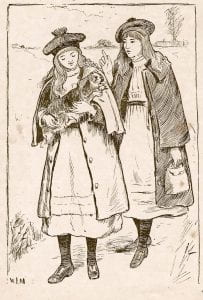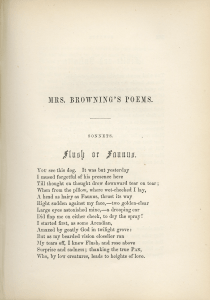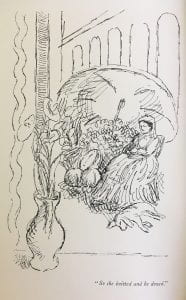By Allison Scheidegger, PhD Student, Department of English, Baylor University
This spring, the Armstrong Browning Library is hosting “Puppy Love: An Exploration of Victorian Pet-Owner Relationships,” an exhibition on dog ownership and depictions of dogs in the Victorian period, with a focus on Elizabeth Barrett Browning’s spaniel, Flush. January 15, 2022 – August 15, 2022.
When I began the summer internship of curating the ABL’s “Puppy Love” exhibition, my motivations had little to do with a deep love for dogs. On the contrary, I came to the “Puppy Love” exhibit as an outsider. Because I didn’t grow up with pets, I’ve never been sympathetic to affection for dogs. The mess, the fur, the noise, the smells—dogs to me were a recipe for inconvenience and annoyance. Instead, my goals coming into the internship were academic. I knew that I would need to use the ABL’s special collections for my dissertation research, and I wanted to familiarize myself with the ABL’s resources and databases ahead of time. But in the process of curating this exhibit, I researched my way into liking dogs! This blog post tells the story of my evolving feelings about dogs, as well as how I am integrating the experiences gained into my teaching roles.
I’ve already begun to see how my experience curating this exhibit will enhance my teaching. This past fall, after spending the summer working on this exhibit, I taught an honors colloquium session on Browning’s Flush poems and Woolf’s Flush: A Biography. I enjoyed pushing students not only to consider how the social issues raised in Flush persist today but also to bring personal experiences of pet ownership to bear in the conversation. Channeling my audience’s natural enthusiasm about a topic, rather than insisting on a purely academic discussion, is a skill I developed in this internship.
In the future, when I teach British literature, I also plan to involve my students in the process of archival research. Special collections can be intimidating for the student researcher—they certainly were for me! They tend to use different organization methods and require different procedures for requests. I want to equip my students with strategies for using the ABL’s special collections and for approaching special collections in general.
As one of my fellow English graduate students aptly expresses it, “I recognize that my dislike for dogs is a deficiency in my soul.” After spending the summer perusing dog stories of all kinds, I’m convinced that one of the functions of literature is to train us to love good things (in this case, dogs). The poems, letters, and stories I read this summer retrained me to have an appreciation—even a fondness—for dogs. The “Puppy Love” exhibit showcases several collections of animal stories written for the purpose of early childhood training, alongside a few unusual animal stories that prompt adults to reconsider their pets in a new light. One of these animal stories for adults, E. B. Browning’s poem “Flush or Faunus,” was particularly meaningful for me.
As Flush comforted Browning after the death of her favorite brother, Browning was surprised by the emotional capacity of what she had considered a “low creature.” In comparing Flush with Faunus, a half-man, half-animal god of revelry, Browning suggests that pets offer an unconditional, inter-species love that mirrors God’s transcendent love. This poem taught me not to dismiss people’s love for their dogs as empty sentimentality or the projection of emotions, but rather to appreciate the ways in which pets offer a unique type of friendship and comfort which human friends can’t provide. The physical and emotional bond between Browning and Flush is fascinating: they are so close that at times they resemble each other!
Heavy curls hung down on either side of Miss Barrett’s face; large bright eyes shone out; a large mouth smiled. Heavy ears hung down on either side of Flush’s face; his eyes, too, were large and bright: his mouth was wide. There was a likeness between them. As they gazed at each other each felt: Here am I—and then each felt: But how different! (Woolf 26)
The difference between them is equally important. While Flush is sympathetic to Browning’s sadness, he also manages to cheer her with his cuteness and his antics, which Browning describes in “To Flush, My Dog”:
Leap! thy broad tail waves a light;
Leap! thy slender feet are bright,
Canopied in fringes.
Leap —those tasselled ears of thine
Flicker strangely, fair and fine,
Down their golden inches (The Poetic Album 235)
In my reading, I’ve been struck by how deeply Victorian pet owners like Browning celebrate the physical presence of their dogs. In “Flush or Faunus,” Flush interrupts Browning’s grief by invading her space. He pushes his head against Browning’s face and flaps her with his ears to wipe the tears from her cheeks. E. B. Browning’s and Virginia Woolf’s depictions of Flush taught me to appreciate dogs for their doggy-ness, and for how, by their presence and their unconditional love, they forge a close bond with us. This project convinced me to pet a dog and let him lick me instead of recoiling in horror as I would have in the past! A few weeks later, I was ecstatic when a friend’s dog jumped up beside me on the sofa and rested his head on my lap. I experienced this summer how stories can train—or re-train—us to appreciate animals.
Works Cited
Aunt Louisa’s Choice Present: Comprising Famous Horses, Noted Horses, Famous Dogs, Noted Dogs (or Horses & Dogs). Illustrated by John Frederick Herring, Sr., and Sir Edwin Landseer. Printed by J. Butterfield. London: Frederick Warne and Co., 1876.
Molesworth, Mary Louisa. Lucky Ducks and Other Stories. Illustrated by W. J. Morgan. London: Society for Promoting Christian Knowledge, 1891.
The Poetic Album: Containing the Poems of Alfred Tennyson, Mrs. Elizabeth Barrett Browning, and Alexander Smith. Philadelphia: Willis P. Hazard, 1854.
Woolf, Virginia. Flush: A Biography. Hogarth Press, 1933.
Read more in this series of blog posts about the exhibit “‘Puppy Love’: An Exploration of Victorian Pet-Owner Relationships”:
- Victorian Pet-Owner Relationships in the ABL’s Archive (March 16, 2022)
- “Puppy Love”: Inside the Process (April 13, 2022)
- Victorian Print Culture and Pet Culture (May 18, 2022)
- Reception of E.B. Browning’s and Virginia Woolf’s Dog Writing (June 15, 2022)
- “Puppy Love” Closing Announcement (August 3, 2022)




